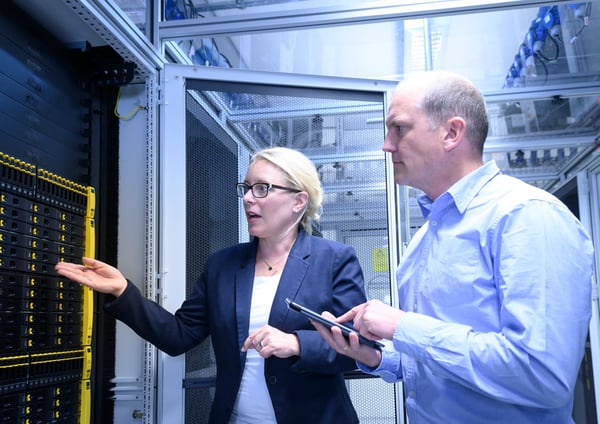
It is already one of the certainties of the Corona pandemic: digitization has accelerated further, and it has become even more important for companies to have reliable access to their data at all times. To achieve this, companies need to secure their computer systems against attacks from the virtual realm - cybersecurity is more in demand than ever. On the other hand, it is at least as important to operate their own data centers securely or to use reliably secured cloud services. "Data security starts in the data center. If a data center fails, central processes come to a standstill. Operational reliability and optimum availability are therefore essential criteria that a modern data center must meet," explains Rolf Walter, who, as Head of Data Center Service at TÜV Rheinland, analyzes data centers for numerous companies and organizations.
"Elk test" of newly built data centers
In order to operate a data center safely and with "high availability" after it has been built, failures of the power and cooling technology or other components of the data center that are important for operation are decisive, in addition to risk factors in the environment, such as hazards from floods, heavy rain, fires on roads and railroad tracks. TÜV Rheinland experts systematically test new data centers before they are put into operation for the first time to ensure that the technical building equipment (TGA) is functioning properly. "For example, we examine data centers in a kind of 'elk test' to determine whether the backup systems take over properly in the event of air conditioning failures. In this way, we want to eliminate risks to operations as far as possible. In addition, we support the operator in developing emergency concepts," explains Walter. The importance of this was demonstrated some time ago by the example of an insurance company. In its data center, there was a faulty valve setting. As a result, when the primary air conditioning system failed, the backup system no longer cooled the systems either. The fault caught the attention of TÜV Rheinland's experts in good time. "If technical faults are detected before the data center is put into operation, a total failure of all IT systems in the plant can possibly be prevented," says Rolf Walter.
European data center standard DIN EN 50600
According to Walter, anyone who wants to build or renovate a data center should follow the specifications of the DIN EN 50600 standard. The European standard DIN EN 50600 explains comprehensively and systematically how to design, plan, construct and operate data centers. Companies that have their data center certified according to the standard increase the security of their data center and reduce its susceptibility to faults. One benefit of certification: "Companies that use cloud services are increasingly paying attention to whether their service provider's data centers are certified to DIN EN 50600," Walter notes. "Anyone who uses a data center themselves or keeps other companies' data in their data center should consider certification."
Data volumes will continue to grow rapidly and this will increase the demands on data centers to process the data reliably. "Our experience shows that operators often do not consider expanding or converting their own data center until it is too late. This usually leads to unnecessary additional costs that can be avoided with good planning."


